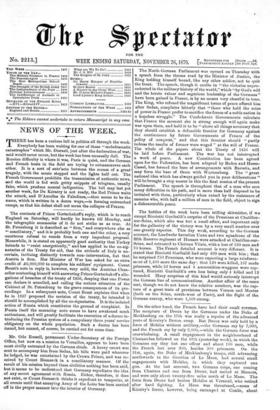The contents of Prince Gortschakoff's reply, which is to reach
England on Saturday, will hardly be known till Monday, and -the telegraphic summaries of it do not strike us as true. At St. Petersburg it is described as "firm," and everywhere else as "conciliatory," and it is probably both one and the other, a very courteous refusal to recede from a very impudent proposal. Meanwhile, it is stated on apparently good authority that Turkey intends to "resist energetically," and has applied to the co-sig- nataries of the Treaty for aid, that the attitude of Italy is un- certain, inclining distinctly towards non-intervention, but that Austria is firm. Her Minister of War has asked for an extra credit of £6,000,000 to complete his soldiers' equipment. Count Beust's note in reply is, however, very mild, the Austrian Chan- oellor contenting himself with answering Prince Gortschakoff's alle- gations of breaches of the treaty of 1856, denying that one Power can declare it annulled, and calling the serious attention of the Cabinet of St. Petersburg to the grave consequences of its pro- ceedings. In a subsequent note, Count Beust explains that when he in 1857 proposed the revision of the treaty, he intended it should be accomplished by all the co-signataries. It is the isolated action of Russia which constitutes the ground of complaint. In Russia itself the menacing note seems to have awakened much enthusiasm, and will greatly facilitate the execution of a decree in- troducing the Prussian system of a compulsory three years' service obligatory on the whole population. Such a decree has been issued, but cannot, of course, be carried out for some time.


































